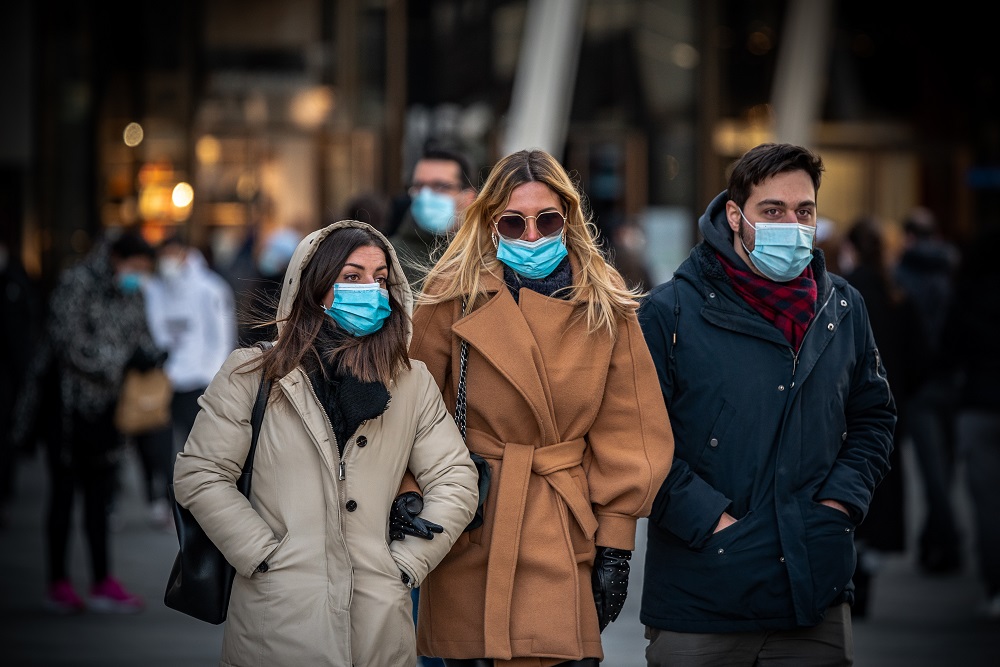Measures such as lockdowns and masks ‘unequivocally reduced Covid infections’

Measures taken during the Covid-19 pandemic such as social distancing and wearing face masks “unequivocally” reduced the spread of infections, a new report has found.
Experts looked at how effective non-pharmaceutical interventions (NPIs) – not drugs or vaccines – were when applied in packages that combine a number of measures that complement each other.
The Royal Society report, called Covid-19: Examining the effectiveness of non-pharmaceutical interventions, reviewed the evidence gathered during the pandemic for six groups of NPIs and their effectiveness in reducing transmission.
These included masks and face coverings, social distancing and lockdowns, test, trace and isolate, travel restrictions and controls across international borders, environmental controls, and communications.
When assessed individually, there was positive – if limited – evidence of transmission reduction from many of the NPIs used in the pandemic, the review found.
However, evidence of a positive effect was clear when countries used combinations of NPIs.
Additionally, evidence showed NPIs were most effective when the intensity of transmission was low, supporting their use early in a pandemic and at first sign of resurgence.
During the early stages of responding to an emerging infectious disease, NPIs tend to be the only controls available before the development of drug treatments and vaccines.
However, as was seen around the world during the pandemic, their use can have adverse personal, educational and economic consequences – making assessment of their effectiveness essential.
Effective
Professor Sir Mark Walport, foreign secretary of the Royal Society and chairman of the report’s expert working group, said: “There is sufficient evidence to conclude that early, stringent implementation of packages of complementary NPIs was unequivocally effective in limiting Sars-CoV-2 infections.
“That does not mean every NPI was effective in every setting, or at all times, but learning the lessons from the wealth of research generated in this pandemic will be key to equipping ourselves for the next one.”
The review found social distancing and lockdowns were the most effective category of NPIs.
Stay-at-home orders, physical distancing and restrictions on gathering size were repeatedly found to be associated with significant reduction in SARS-CoV-2 transmission.
The more stringent the measures were the greater the effect they had, the experts found.
In care homes, measures such as cohorting and visitor restrictions were associated with reduced transmission and reduced outbreaks.
Additionally, the report found that in school settings, closures and other distancing measures were associated with reduced Covid-19 cases, but the effectiveness varied depending on a range of factors, including adherence and pupils’ ages.
Facemasks
When looking at the use of facemasks and mask mandates, studies consistently reported the measures were an effective approach to reduce infection.
The evidence further indicates higher-quality respirator masks (such as N95 masks) were more effective than surgical-type masks.
Assessing test, trace and isolate measures, studies from several countries which implemented high levels of contact tracing, with isolation of infected individuals and their contacts, found reductions in Covid-19 deaths.
For the future, the report recommends establishing international protocols for conducting clinical trials and observational research on NPIs in advance of further pandemics.
Professor Chris Dye, professor of epidemiology at the University of Oxford, said: “The next thing is Disease X as WHO (World Health Organisation) has called it.
“We don’t know what it’s going to be, we don’t know where it’s going to appear.
“So we need a system which is generic enough in character to handle anything of that kind, and for me, the number one priority is to have a global system of surveillance response.”
Professor Christl Donnelly, head of department and professor of applied statistics, University of Oxford, and professor of statistical epidemiology, Imperial College London, said: “We can’t say for certain, and we wouldn’t try to, what might be implemented in future.
“But we can characterise the impacts of what happened with the coronavirus, and that will inform decision-making but then of course, in a future pandemic, more data will need to be collected.”
The new report draws together the findings of six expert-led evidence reviews, published in a special themed issue of the journal Philosophical Transactions of the Royal Society A.
The reviews looked at thousands of published studies, and identified papers that were suitably robust for inclusion in each review category.
Support our Nation today
For the price of a cup of coffee a month you can help us create an independent, not-for-profit, national news service for the people of Wales, by the people of Wales.





All pretty obvious really,but not if you don’t want to hear it.Florence Nightingale et al had worked out basic fresh air stuff a long time ago.Acceptance in Victorian times was very slow too